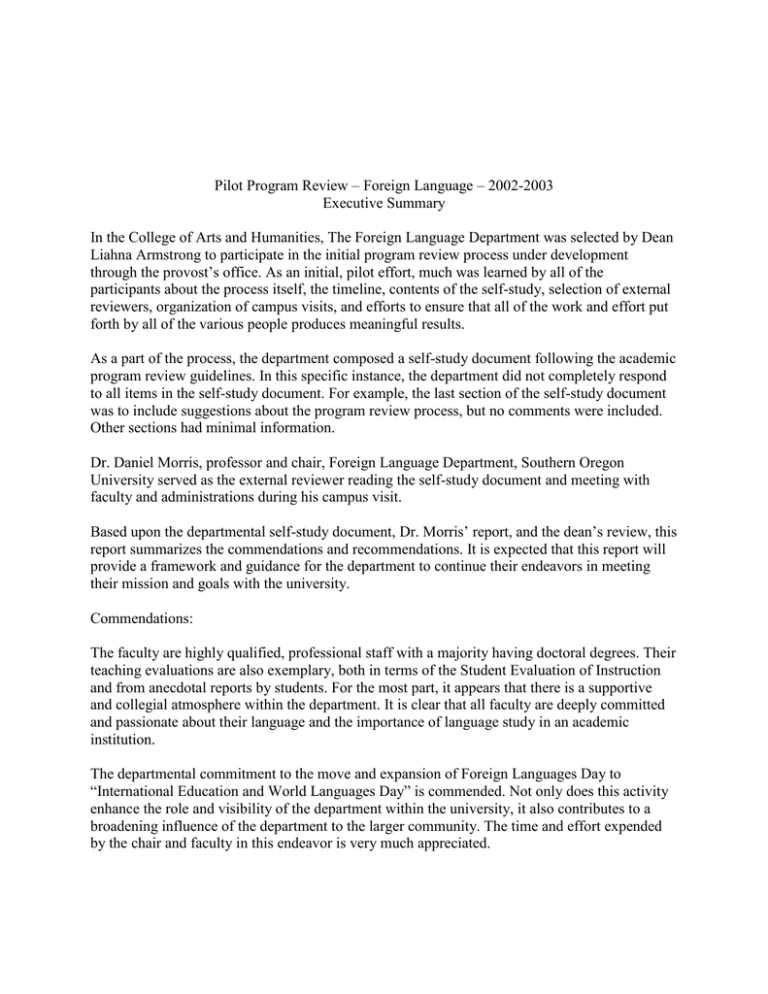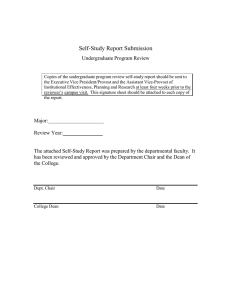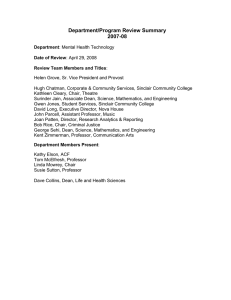Pilot Program Review – Foreign Language – 2002-2003 Executive Summary
advertisement

Pilot Program Review – Foreign Language – 2002-2003 Executive Summary In the College of Arts and Humanities, The Foreign Language Department was selected by Dean Liahna Armstrong to participate in the initial program review process under development through the provost’s office. As an initial, pilot effort, much was learned by all of the participants about the process itself, the timeline, contents of the self-study, selection of external reviewers, organization of campus visits, and efforts to ensure that all of the work and effort put forth by all of the various people produces meaningful results. As a part of the process, the department composed a self-study document following the academic program review guidelines. In this specific instance, the department did not completely respond to all items in the self-study document. For example, the last section of the self-study document was to include suggestions about the program review process, but no comments were included. Other sections had minimal information. Dr. Daniel Morris, professor and chair, Foreign Language Department, Southern Oregon University served as the external reviewer reading the self-study document and meeting with faculty and administrations during his campus visit. Based upon the departmental self-study document, Dr. Morris’ report, and the dean’s review, this report summarizes the commendations and recommendations. It is expected that this report will provide a framework and guidance for the department to continue their endeavors in meeting their mission and goals with the university. Commendations: The faculty are highly qualified, professional staff with a majority having doctoral degrees. Their teaching evaluations are also exemplary, both in terms of the Student Evaluation of Instruction and from anecdotal reports by students. For the most part, it appears that there is a supportive and collegial atmosphere within the department. It is clear that all faculty are deeply committed and passionate about their language and the importance of language study in an academic institution. The departmental commitment to the move and expansion of Foreign Languages Day to “International Education and World Languages Day” is commended. Not only does this activity enhance the role and visibility of the department within the university, it also contributes to a broadening influence of the department to the larger community. The time and effort expended by the chair and faculty in this endeavor is very much appreciated. The use of study abroad to give majors direct experiences with the language and culture of the selected country contributes to students’ knowledge. While the external reviewer noted the weaknesses with this particular approach, nevertheless, it still provides for an enriching experience for the major students. The department’s contributions to area studies programs are essential for these programs. Building upon these strengths, the department also has some work to complete. In the words of Dr. Morris, the “department needs to develop a plan to guide the evolution of the department in the future.” All academic institutions are finding themselves facing issues and challenges that, how they are addressed, will impact the nature and quality of programs. The Foreign Language Department is no different. It is also true, as pointed out by Dr. Morris, that this discussion and planning needs to include all members of the department and reflect what can be reasonably expected and accomplished within the social and political context of diminishing resources. Recommendations: The major recommendation for the department is to craft a strategic plan that will help guide the department and administration through the variety of issues facing the department. These issues include the type of support and the nature of the languages being offered through the department; level of staffing for each of the selected languages; and enhancing the role of the department in teacher education. As Dr. Morris states, “The department needs to develop a plan that will be proactive rather than reactive to circumstances or external influence.” The department should review its curricula in terms of currency and based upon what they teach students, craft an assessment plan that provides data about what their graduates know and can perform. As Dr. Morris noted, there is very little evidence in the self-study document or the university catalog to demonstrate how the language curricula emphasizes proficiency-based instruction, applied application of language and contemporary culture. In addition, neither is there evidence in the self-study document about what graduates of the program are expected to demonstrate or their successes after they leave the university. Having data about both will help to strengthen the department’s evidence about quality programs. As a part of this curricular analysis, the faculty will want to consider how to better use technology in foreign language instruction. The department will want to continue to work on faculty morale and cohesiveness, so that tensions between and among faculty are not detrimental to the overall atmosphere within the department. Continue working on augmenting the connections with teacher education and consider various ways in which the department can reach out to the public schools in order to attract students to study of languages. The various documents produced in the review suggests that there has been angst about the appropriate directions for the department to move, the languages that should be taught, and the effectiveness of communication both within and beyond the department. While some of these issues persist, there is evidence that progress has been made in addressing them. Recommendations for Dean and Provost’s Office: Provide guidance and assistance as the department works through its strategic planning process. Continue to strengthen the communications between and among the chair, faculty and administrators. Continue to support World Languages Day. Overall, the Foreign Language Department is at a stage where time and energy spent on considering their role and mission within the broader context of the university will pay dividends in the future.

